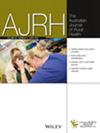To evaluate the effectiveness of Royal Far West allied health telehealth services to support the health and well-being of children affected by the bushfires.
In response to the 2019/2020 Black Summer bushfires, Royal Far West (RFW) implemented the Community Recovery Services (CRS) targeting the health and well-being of affected children. One component of the CRS was the delivery of allied health telehealth services to children.
One hundred and thirty-five children participated in occupational therapy, psychology and/or speech pathology telehealth. Forty-eight parents/carers completed a telehealth satisfaction survey.
Measures used to determine effectiveness included child and parent/carer satisfaction surveys, the Canadian Occupational Performance Measure (COPM), the Goal Attainment Scale (GAS) and the Strengths and Difficulties Questionnaire (SDQ).
The children overwhelmingly stated that they felt listened to (89%), enjoyed telehealth sessions (84%) and learned new ways to cope with their feelings (87%). Parents/carers reported that children had developed effective emotional regulation and coping strategies. COPM outcomes indicated the children demonstrated statistically significant large improvements in their self-perceived performance of and satisfaction with their identified goals, p < 0.001. The GAS outcomes indicated that 86% of children attained or exceeded their set goals. A statistically significant improvement in children's mental health outcomes post-telehealth was found, as measured by the SDQ (p < 0.05).
Occupational therapy, psychology and speech pathology telehealth sessions contributed to positive health and well-being outcomes for children affected by the bushfires. The findings support the implementation of RFW's five key principles for telehealth services: (1) Access to a multidisciplinary team; (2) Practical resources; (3) Flexible delivery; (4) Providing in-person session to support telehealth and (5) Take a ‘whole of child’ approach. Innovative telehealth offered children in geographically remote areas access to effective allied health support post-disaster that was not readily available in their local communities.


